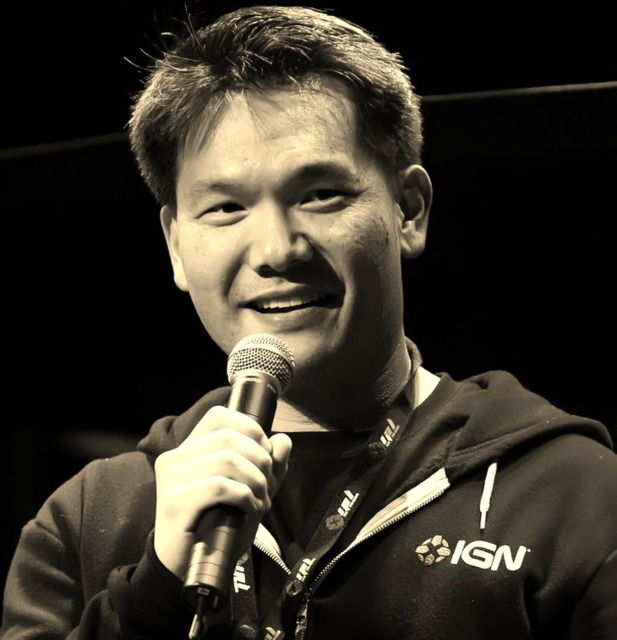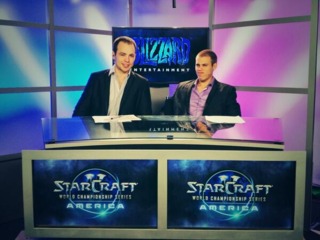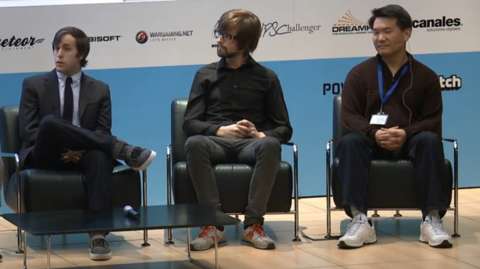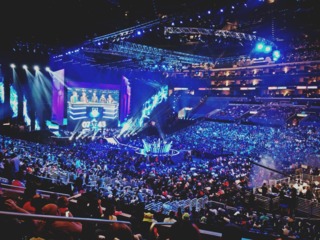Valencia eSports Congress - One Year On
What a difference a year makes.
This article was originally published on GameSpot's sister site onGamers.com, which was dedicated to esports coverage.
“We’ll be remembered more by what we destroy than what we create.”
- Chuck Palahniuk
On September 21 2012, Valencia, Spain was the site of the eSports Congress - a series of discussion panels broadcast live on Twitch.tv. It brought together industry leaders from professional teams, video game developers and professional eSports leagues to talk about major issues surrounding our great world.
I like milestones, because I think they’re a nifty measurement of growth.
So, let’s have a look back at a few things that happened on that day in Spain, and what's happened since.

David Ting (IGN/IPL) said: An international body for eSports, similar to FIFA for soccer, would be harmful in the current state of the industry, because inevitable restrictions would prevent innovation, saying the kind of “survival of the fittest” state between eSports organisations was healthy.
Ting also expressed that he felt the large prize pools put up by Valve and Riot in 2012 were too high and put unrealistic expectations on other eSports organisations.
What Happened: “Survival of the fittest” indeed - even though David Ting was a huge fan of the competitive environment between eSports organisations, IPL collapsed five months after this conference, one month before IPL6 in Las Vegas, which was, of course, cancelled.
Boo, Darwinism.
Blizzard stepped in and rescued a whole bunch of them, forming their new San Francisco office and bringing in some of the former IPL staff to work in their eSports department. That’s nice and all, because IPL felt like a unique event with unique things to offer, but one must note that uniqueness has not really translated to the production they’re doing for Blizzard. Not that it’s bad - it’s not - but it’s not exactly inspiring.

Still, early days and all. Relatively speaking. There were good minds at IPL, and it's comforting to know they ultimately had a place to go.
In regards to prize pools, the large prize numbers set by Riot and Valve in 2012 - $2 million and $1.6 million respectively - got even larger still.
Riot has reportedly given away over $8 million globally during Season 3.
That’s a lot of freakin’ Pool Party skins and Jinxes. Jinxeses. Jinxii.
Valve awarded just under $2.9 million at TI3, $1.7 million of which was raised through contributions via the interactive Compendium.
Alex Garfield (Evil Geniuses) said: During the panel 'Will eSports survive without an international body similar to FIFA?', one of Garfield's main points was that, if a body was formed, it would help provide analytics to teams. The teams could then use these analytics to present real, tangible numbers to sponsors, which would help the industry grow overall.

What happened: From the outside, it seems to remain difficult for teams to distinguish exactly how many eyeballs are on their sponsors' logos at any given time, let alone on a tournament. When Riot released their unique viewer numbers for their S3 World Championship - 32 million - some went to so far to say those numbers were false, that they have no way of proving that was the case. Viewership numbers tend to be released by organisations, instead of independent sources with nothing to gain. It's difficult for some to let go of the possibility that numbers could be inflated by people trying to impress American Express, Coca Cola, Dr Pepper, et al.
It must be conceded that the nature of broadcasting live eSports makes it difficult for numbers to be ascertained. Online broadcasts are streamed via a streaming service, and it would be up to that streaming service to provide statistics at their own discretion, in however much detail they choose. Many events are simultaneously broadcast on state television, as we've seen in Sweden, China and Korea, which is a different set of numbers altogether, with statistics determined in an entirely different way again.
There also remains a lack of uniformity among tournaments as to how much exposure they give team names, team logos, let alone team sponsors. But would an international body set regulations for that? What would an international body be responsible for?
Won Suk Oh (IeSF) said: When/if the body is formed, it should start by standardizing regulations around competition.
What happened: In 2013, IeSF ran a gender segregated competition (ie: This year, LoL was male only, SC2 was female only).
Yeah. I’m sure an international body would be cool with that.
Oh, wait. Nope. Probably not.
Stuart Saw (Own3d) said: The VOD for this particular panel, 'Is eSports the next big thing?', seems to be missing. But remember Own3d?
What happened: Own3d was Destiny'ed in the face on January 17, 2013, when Steven Bonnell wrote a blog detailing late payments and various contractual breaches on behalf of Own3d, even going so far as to publish Skype logs, and his contract with Own3d in full, to demonstrate just how vigorously he had been screwed over.
On January 31, 2013, Own3d's COO Oleg Kogut appeared on Live on Three, confirming the company was shutting down and that all VODs stored on Own3d's servers would be deleted within 24 hours. djWHEAT promptly almost died of a heart attack live on air as he passionately pleaded with viewers to save whatever they could. Own3d was popular particularly with prolific Dota2 streamers, joinDOTA, and League of Legends team CLG, just to name a few.
These days, Stuart Saw is the regional director of EMEA at Twitch, and Oleg Kogut is the head of live and gaming at Dailymotion, and Rene Weinberger, the former Own3d CFO, is now CEO of hitbox.tv, proving that eSports is a loving, forgiving community where everyone gets a second chance.
Honorable Mention: Having an eSports congress of any kind without a representative from Riot and/or Valve is like having a UN meeting without the US and China - you can talk all you like, but any second, one of those powerhouses can come in and drop bombs on everything, making everything discussed redundant. Metaphorical bombs, of course, made of love and eSports rainbows, but bombs all the same.

In 2013, the bombs were indeed dropped - the League of Legends World Championship and Dota2's TI3 were two of the biggest eSports events of the year, and there are no signs of slowing down or pulling back by either of those companies in 2014.
At the time of the eSports congress in Valencia, there were unconfirmed reports that Riot had been invited to send a representative, but either were unable to send someone, or declined the invitation.
What We Have Learned: There's so much that could be written about the congress. If you have time, I strongly suggest going back over the VODs. Even though this congress happened a year ago, these same discussions could be happening now. Apart from increased communication between eSports organizations - which is still messed up occasionally, and you can watch it unfold via the magic of social media - none of the issues have been resolved.
If it's possible for a world to be growing quickly and slowly at the same time, that seems to be what's happening. The jumps are large, and the casualties, though few and far between, are significant. Some of these people deemed so important to attend a congress in Spain, less than a year later fell from the platform upon which they were invited. And yet these fundamental questions about progress, where we're actually heading, what we actually want out of all this, remain unanswered.
We're just a car driving in the night, really - it's difficult to see past what the headlights illuminate, but we'll reach our destination eventually.
Wherever that may be.
Got a news tip or want to contact us directly? Email news@gamespot.com
Join the conversation